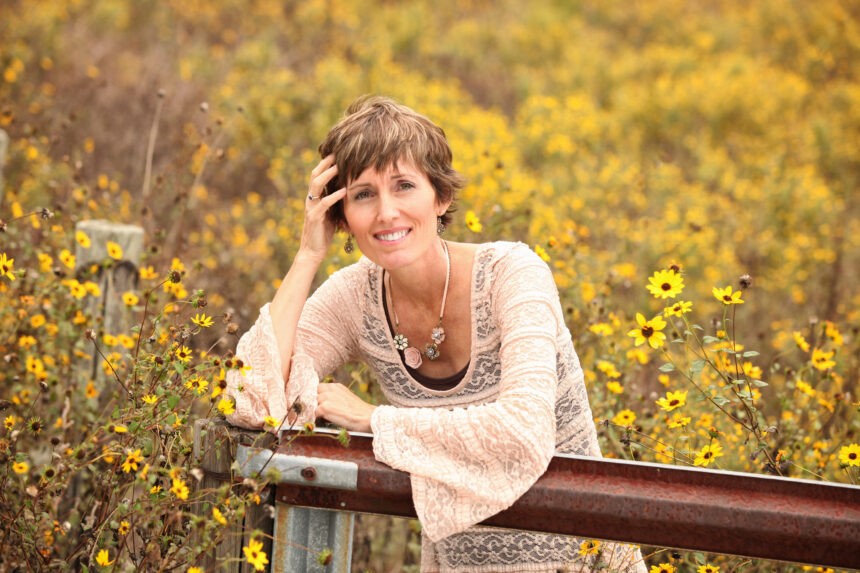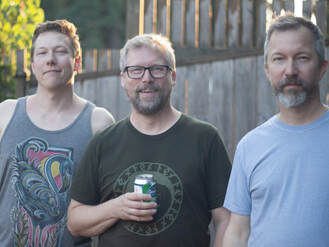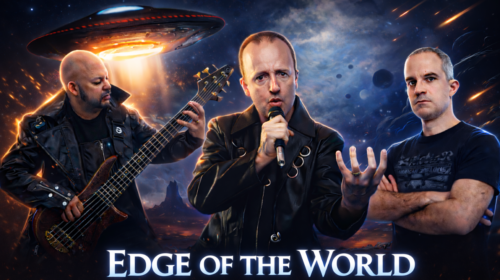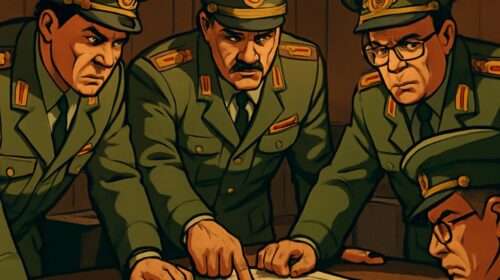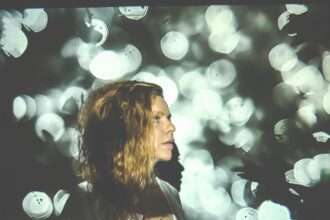Christie Cook is an indie musician whose journey has been shaped by faith, personal experiences, and a deep connection to music. From a young age, music was not just a passion for Christie—it was a calling, something that resonated deeply with her soul. Despite a challenging upbringing, she stayed true to her love for music, studying classical piano and later picking up the guitar. As she quietly wrote songs, her passion grew, and it wasn’t long before she found the courage to share her music with others, sparking a journey that continues to evolve today.
Christie’s music is rooted in folk traditions, with a focus on storytelling and sharing real-life experiences. Her Christian songs are unique in their approach, often taking a narrative-driven route that invites listeners to connect on a deeper level. Throughout her music, she strives to balance strong vocals, rich instrumentation, and thought-provoking lyrics, ensuring that each song feels meaningful and hopeful.
In this interview, Christie opens up about her challenges as an indie artist, her creative process, the personal themes that inspire her lyrics, and her long-term goals. Join us as we delve into her world of music, faith, and the power of storytelling.
Can you tell us about your journey as an indie musician? What inspired you to pursue a career in music?
Music has always been an integral part of who I am—it’s not something I consciously decided to pursue, but rather something I felt deeply wired to do. I believe God placed this calling in my heart. Whenever I tried to walk a different path, I felt disconnected, like a part of me was missing. But when I’m playing, writing, or producing music, I feel whole—centered, balanced, and truly myself.
I started studying piano as a child and was also drawn to the guitar. Coming from a broken home, my training wasn’t always consistent, but music remained my constant companion. I went on to study classical piano in college and later picked up the guitar, quietly writing songs in secret. Eventually, I found the courage to share my music with others, and once I did, I couldn’t stop. The songs just kept coming, and I’ve been on this journey ever since.
How would you describe your unique style and sound as an artist? What sets you apart from other musicians?
My style leans heavily into folk, with a focus on storytelling and real-life experiences. practically all of my Christian songs aren’t traditional praise and worship but are instead narrative-driven, painting pictures of life and faith in ways listeners can connect with. I think that what sets me apart might be my dedication to creating a balance between the story, the vocals, and the instrumentation. To me, the arrangement is just as important as the lyrics or my voice—it’s a vital part of how the story is told.
I keep my sound very acoustic and organic, with a clear focus on each instrument’s role, and my vocal clear and up front. I love giving instrumentalists the freedom to shine, whether through solos or intricate fills, rather than having them stick strictly to accompaniment. This approach brings an added depth and texture to my music.
I also use a variety of instrument combinations depending on the mood of the song—sometimes it’s a simple blend of guitar, mandolin, and fiddle; other times, it’s more expansive, with cello, piano, or even a full band. Regardless of the arrangement, my goal is always the same: to draw listeners into the experience and help them feel what I felt. And no matter how personal or emotional the song may be, I always strive to bring it back to hope and positivity. I want listeners to walk away feeling that they’ve heard something meaningful and worthwhile.
Could you share some of the biggest challenges you’ve faced as an indie musician and how you overcame them?
One of the biggest challenges I’ve faced as an indie musician has been embracing the idea that it’s okay not to sound like everyone else. The music industry has changed so much, and finding confidence in my unique style and voice has been a journey.
Social media has also been a significant challenge. As someone who’s naturally a bit shy, especially in front of a camera, I’ve had to dig deep to find the courage to share my music and my story. It’s been intimidating at times, and balancing the demands of promoting my work while still dedicating time to writing, practicing, and creating hasn’t been easy.
I once heard that indie musicians spend 80% of their time promoting and only 20% on their instruments or performing. At times, it does feel like that. But I’ve worked hard to streamline the process and keep my focus on what truly matters—making music. I remind myself that social media, despite its challenges, is also a gift. It allows me to connect with people I might never have reached otherwise, in places like South Africa, Europe, Australia, Quebec, Brazil, etc. Knowing my music is touching hearts across the world makes the effort worthwhile.
Now, I approach social media as an opportunity to spread light and positivity. If I can touch even one person’s heart with my music, I’ve achieved my goal. It’s a balancing act, but I’m learning to navigate it in a way that works for me.
What is your creative process like? How do you approach songwriting and composing music?
My creative process often begins with life itself—experiences that move or challenge me in a significant way. For example, when I faced a long illness, I found myself writing songs about perseverance, faith, and holding on to hope. Writing becomes a way to process and express what I’m going through, and I hope it resonates with others in similar moments.
I’m also a big believer in Picasso’s saying, “Inspiration is always there, but it must find you working.” There are days when I don’t feel particularly inspired, but if I sit down at the piano or with my guitar, something usually starts to emerge—a melody, a rhythm, or even just a line or two of lyrics. Other times, the inspiration feels effortless, like being drawn to the piano where ideas flow naturally.
Sometimes I’ll hear or read a phrase that sparks something, and I’ll start building from there. It’s not always a linear process—there are moments when I write a line or two and then feel stuck. In those times, I step away, often doing something unrelated like working outside or tackling a household task. Strangely, those moments of distraction often bring clarity, and new ideas will suddenly come to me.
I’ve also learned that songs can take on a life of their own. I might start with a strong intention for a song, but as I write, it sometimes shifts in an entirely different direction. When that happens, I try to stay open to that quiet, guiding voice that says, “What about this?” or “Try here, not there.” Being willing to erase, rewrite, and follow where the song leads has been an important part of my process.
Ultimately, songwriting is about staying present, being patient, and trusting the creative flow, even when it takes unexpected turns.
Are there any particular themes or messages that you aim to convey through your music? What inspires your lyrics?
The themes in my music are deeply rooted in real-life experiences—moments of pain, joy, humor, and reflection. Life itself is my greatest inspiration, whether it’s memories of growing up in the farmland of Minnesota, the beauty of falling in love, or something as simple and heartfelt as the bond with a pet. For example, I’ve written a jazzy song about my cat and a heartfelt song about my dog, Blanca, that listeners might mistake for a love song about a best friend.
I aim to write in a way that feels universal, allowing listeners to see themselves in the stories I tell. One example is a song I wrote called Second Chances. Many people might assume it’s written to my husband, but it’s actually a prayer to God. My intention is always to connect with people, to encourage them, and to offer a reason for hope.
Suffering often brings out some of my most heartfelt songs, but so does indescribable joy. I strive to capture both the struggles and the beauty of life, pointing to the miracles all around us that we sometimes overlook. With my Christian songs, I aim to subtly point to Jesus, presenting faith in a non-confrontational, relatable way—not preachy, but thoughtful and encouraging.
Even when I write about challenges or pose questions in my songs, I always bring them back to hope. Life inspires my lyrics, and through them, I try to remind people that joy, beauty, and faith are still abundant in this world.
What are your long-term goals as an indie musician? Where do you see yourself and your music in the next few years?
My long-term goal as an indie musician is to see my music reaching people all over the world, touching lives in a very positive way, and growing my listener base on streaming platforms. I have a collection of songs ready for release that I’m really excited about, and I look forward to sharing them with more audiences.
As for where I see myself in the next few years, I try not to focus too much on the distant future. Instead, I concentrate on what I can do today, putting my energy into creating, recording, and taking steps forward. I like to think of it as putting my foot into a plan and letting God guide the next steps from there—it’s always an adventure with Him. And He always guides.
But right now, my focus is on recording and producing new songs; but I hope to perform more in the coming years. There’s something incredibly special about singing directly to people, sharing music face-to-face, and connecting with audiences in a live setting.
For now, I’m staying busy in the studio, creating music that I hope will inspire and encourage listeners everywhere.


